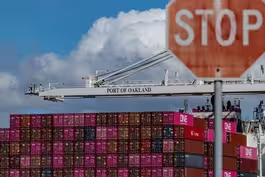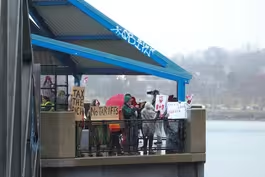
Tamara Keith and Amy Walter on political fallout of tariffs
Clip: 4/7/2025 | 9m 20sVideo has Closed Captions
Tamara Keith and Amy Walter on Trump's tariffs and the political fallout
NPR’s Tamara Keith and Amy Walter of the Cook Political Report with Amy Walter join Geoff Bennett to discuss the latest political news, including the political fallout from President Trump's decision to double down on his tariffs and if Democrats can capitalize on the weekend protests against Trump's policies.
Problems playing video? | Closed Captioning Feedback
Problems playing video? | Closed Captioning Feedback
Major corporate funding for the PBS News Hour is provided by BDO, BNSF, Consumer Cellular, American Cruise Lines, and Raymond James. Funding for the PBS NewsHour Weekend is provided by...

Tamara Keith and Amy Walter on political fallout of tariffs
Clip: 4/7/2025 | 9m 20sVideo has Closed Captions
NPR’s Tamara Keith and Amy Walter of the Cook Political Report with Amy Walter join Geoff Bennett to discuss the latest political news, including the political fallout from President Trump's decision to double down on his tariffs and if Democrats can capitalize on the weekend protests against Trump's policies.
Problems playing video? | Closed Captioning Feedback
How to Watch PBS News Hour
PBS News Hour is available to stream on pbs.org and the free PBS App, available on iPhone, Apple TV, Android TV, Android smartphones, Amazon Fire TV, Amazon Fire Tablet, Roku, Samsung Smart TV, and Vizio.
Providing Support for PBS.org
Learn Moreabout PBS online sponsorshipGEOFF BENNETT: Let's delve further now into the political fallout from President Trump's tariffs and his decision to threaten China with even more penalties.
On that and other news we're watching this week, we're joined now by Amy Walter of The Cook Political Report With Amy Walter and Tamara Keith of NPR.
Much to discuss on this Monday.
Let's start with these tariffs, shall we?
Because, Amy, President Trump has described these tariffs as medicine that the country needs.
How sustainable is that framing politically if economic indicators worsen?
AMY WALTER, The Cook Political Report: That's right.
So the place we have to look first is Congress, because actually if there is anybody or anything that can rein in the president on these tariff decisions, it is Congress.
They have the constitutional ability to do so.
Will they do it politically?
No, for this reason.
If you are in Congress right now, especially you're a House member, you have been in Congress, you have been watching Donald Trump since 2016, what have you noticed?
You have noticed that he has defied political gravity time and time again.
And those Republicans who stepped out and said, oh, I don't think this is going to work out, or who criticized the president on things like "Access Hollywood" or January 6 or others found themselves getting ahead of their skis.
And the president, weeks or months later, ends up being fine.
The risk that many of these members find themselves is that either, one, they get out now, try to push back on the president.
That doesn't succeed.
He remembers this and punishes you.
Your voters in your district who are Republicans remember this and punish you.
And there's also the chance that things do end up working out OK, that there is not the economic disaster that many have been forecasting.
One Republican strategist said this to me today.
He said: "There are millions of reasons for Republicans to blink, but none of them are better than just giving this time."
So I think House Republicans, especially, are willing to give the president political time.
GEOFF BENNETT: And, Tam, on the underlying strategy, I mean, senior Trump officials were on the Sunday shows yesterday.
You had Howard Lutnick, the billionaire commerce secretary, striking an aggressive note, saying that tariffs are here to stay.
Two other Cabinet members were on other Sunday shows saying that, oh, no, these can be negotiated.
President Trump on the Oval Office today said, both things can be true.
They can be permanent and they can be negotiated.
How much of this is a structured strategy and how much of this is just the administration reacting to real-time events on the ground?
TAMARA KEITH, National Public Radio: Well, so as we know, President Trump announced this on Wednesday.
Even based on public statements, we know that a decision had not been finalized as of Tuesday afternoon.
So this was not a well-planned rollout.
Since then, there's been a lot of reacting.
But there are a couple of underlying and also conflicting messages.
One is this idea that President Trump is this great dealmaker and somehow he's going to get deals.
Today, he put more of that out into the bloodstream.
He had Prime Minister Netanyahu in the Oval Office and talked about the things that Netanyahu was going to do for the United States.
He's talking about talking to Japan and other countries and everybody wants a deal.
Then, at the same time, he is also saying that he doesn't want to give time for deals to take place.
He wants these tariffs in place now.
He's saying that the U.S. -- this is a great opportunity for the U.S. to reset the table on the global economy and global trade and that it's going to be painful, but he's the man who can take the pain.
Now, there's pain to go around; 62 percent of Americans have some money in the stock market either directly or indirectly.
And I think that's sort of the political challenge that the president faces.
Because he's taking all the positions, it's not clear exactly where this is going.
It's not clear to the markets where this is going.
And so far, there hasn't been sort of a moment where the president sits down with the American people and says, OK, this is our policy.
There are going to be sacrifices.
I understand that.
You need to understand that.
We all need to come together as Americans and accept these sacrifices, which in theory is what would have to happen for him to weather what could be months or years of turmoil.
AMY WALTER: Well, and where voters are on this, you can see that what they think of as the economy is what stuff costs.
TAMARA KEITH: Yes.
AMY WALTER: Now, what the president and many others think about the economy is just structurally what the economy is and how that is going to be upended by these tariffs, we're going to bring in a new sort of order of things that will be very different from what we have had since the end of World War II.
But for voters, that is not what many of them actually want to see from the economy.
They want to see the price of things go down.
GEOFF BENNETT: Well, let's shift our focus to what happened on Saturday, because we saw coast-to-coast opposition to President Trump's second term with more than 1,300 events across the country organized largely by Democratic activists.
Tam, are these Hands Off protests, that's what they were called, Hands Off -- you got that.
You have got Senator Booker's marathon speech.
Are these really early signs of an activated Democratic base or are these mostly episodic expressions of frustration?
TAMARA KEITH: These are definitely expressions of frustration, but it could also be the seeds of something more.
What happens when you have big events like this is, people who are angry and frustrated realize they're not alone in being angry and frustrated.
There are lots of people around them.
Sometimes, these sorts of events cause people to then decide to run for office or to volunteer for people who are running for office or build connections.
It can be the seeds of something.
And we have certainly seen that in the past.
But are these rallies, are these protests, is Cory Booker's long talk on the -- record-breaking talk... GEOFF BENNETT: It can't be called a filibuster, but... TAMARA KEITH: I know I'm getting hung up on the filibuster thing, long talk on the Senate floor.
Is that all a sign that Democrats are no longer in the wilderness, they have figured out their messenger and their message?
No, no, not at all.
They still have a lot to figure out.
If you looked at the signs, they didn't all say the same thing.
And that's often the case, especially with Democrats and protests.
But certainly Democrats have to take some solace in the fact that people are willing to go out of their homes and get together in the streets.
And that shows that people are not just completely depressed, that that energy still exists.
But I don't know that the party has figured out how to harness that.
AMY WALTER: No.
And even if you look at, say, Wisconsin, where Democrats had great success in that Supreme Court race, even as the Democratic candidate there won by 10 points, opinions of the Democratic Party in the state are much more negative than even opinions of Donald Trump.
So voters are coming out and voting for the Democratic candidate or against the Republican, despite the fact that they really don't think any better of Democrats.
So in the short term, yes, if you're the Democratic Party now, you say the energy that's coming from the anti-Trump -- the anti-Trump energy could be enough to take us where we need to go in the midterm elections to flip the House.
And that's where that would go.
It doesn't mean that they have solved all of their problems going into 2028 and who they are and what they stand for.
GEOFF BENNETT: Amy, you answered my question before I asked it, so Tam, I will put it to you.
AMY WALTER: See, it's the mind-meld thing.
GEOFF BENNETT: There you go.
Because the question is, how did Democrats thread this needle between resistance and persuasion, because resistance, as Democrats saw, is not enough.
It's not enough to name and shame Donald Trump.
That doesn't work.
GEOFF BENNETT: How do they persuade those voters who, as Amy points out, they have issues with Donald Trump, but they don't see Democrats as the ones necessarily providing the answers?
TAMARA KEITH: Right, and we saw that Democrats really were just resisting Trump in 2017, when there were big rallies in the street.
There were anti-Trump rallies.
That was an anti-Trump backlash in 2018 with those midterms.
In terms of harnessing this into something that they are also, that the party -- I think the distinction is between voters and the party, because the party does have a really bad name, even with Democratic voters.
AMY WALTER: Yes, and I do think a lot of this will center around the economy.
I mean, we are now talking about nothing but the state of the economy.
This is an opportunity.
Democrats don't like what they're seeing from Donald Trump, to say, this is who we are and this is what our economic vision is.
We know what Donald Trump says.
GEOFF BENNETT: The Nancy Pelosi approach.
AMY WALTER: There we go, right.
GEOFF BENNETT: All right.
Amy Walter and Tamara Keith, thanks to you both.
AMY WALTER: You're welcome.
TAMARA KEITH: You're welcome.
Businesses face impacts of Trump's tariff policies
Video has Closed Captions
Clip: 4/7/2025 | 9m 11s | How businesses are dealing with the impacts of Trump's tariff policies (9m 11s)
Noah Wyle on the authenticity and success of 'The Pitt'
Video has Closed Captions
Clip: 4/7/2025 | 8m 18s | Noah Wyle on the authenticity of 'The Pitt' and what makes it successful (8m 18s)
Ovechkin breaks record to become NHL's all-time goal scorer
Video has Closed Captions
Clip: 4/7/2025 | 7m 20s | Alex Ovechkin breaks Gretzky's record to become NHL's all-time leading goal scorer (7m 20s)
Taiwan prepares citizens for potential invasion by China
Video has Closed Captions
Clip: 4/7/2025 | 7m 46s | With future at risk, Taiwan prepares citizens to resist potential Chinese invasion (7m 46s)
Trump holds firm to his tariffs and threatens more on China
Video has Closed Captions
Clip: 4/7/2025 | 4m 30s | Trump holds firm to his tariffs and threatens more on China (4m 30s)
Providing Support for PBS.org
Learn Moreabout PBS online sponsorship
- News and Public Affairs

FRONTLINE is investigative journalism that questions, explains and changes our world.

- News and Public Affairs

Amanpour and Company features conversations with leaders and decision makers.












Support for PBS provided by:
Major corporate funding for the PBS News Hour is provided by BDO, BNSF, Consumer Cellular, American Cruise Lines, and Raymond James. Funding for the PBS NewsHour Weekend is provided by...




